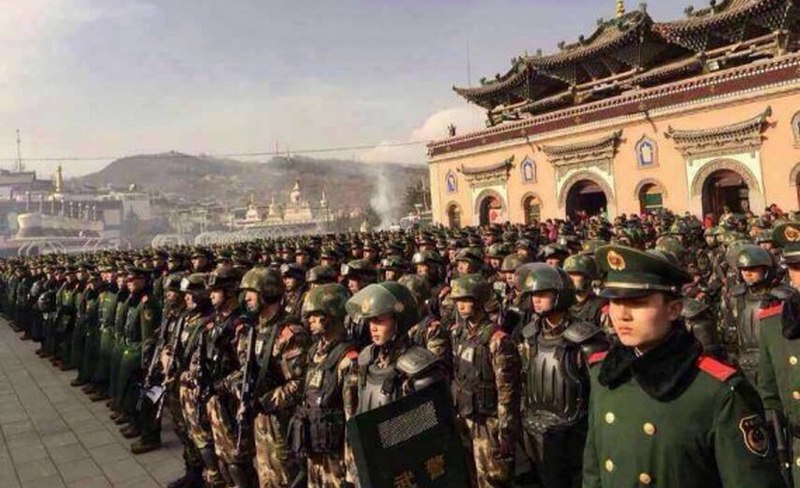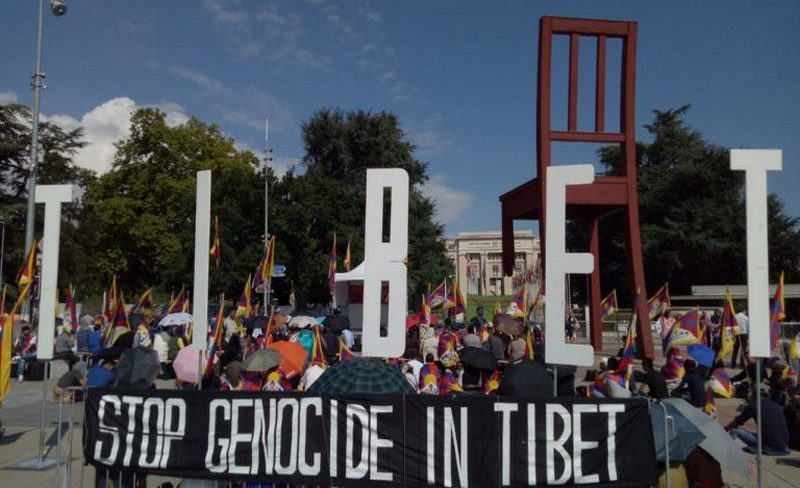Authorities in Tibetan areas continue to severely restrict religious freedom, speech, movement, and assembly, and fail to redress popular concerns about mining and land grabs by local officials, which often involve intimidation and arbitrary violence by security forces. Authorities intensified surveillance of online and phone communications.
There were clear findings by UN human rights experts that the charges were baseless. Nonetheless, courts sentenced former political prisoner Tsegon Gyal in January to three years in prison and language activist Tashi Wangchuk in May to five years.
Several hundred Tibetans traveling on Chinese passports to India for a January 2018 teaching by the Dalai Lama were forced to return early when officials in Tibetan areas threatened retaliation against those traveling abroad and their family members back home.

Intensified political education has been reported in monasteries and schools, and for the public at large. Tibetan authorities have used a nationwide anti-crime campaign to encourage people to denounce members of their communities on the slightest suspicion of sympathy for the exiled Dalai Lama or opposition to the government.
Several more cases were reported in 2018 of land grabs by local officials for construction projects, both in the Tibet Autonomous Region and other Tibetan areas. In Driru county, 30 villagers were detained in May for allegedly sharing with international media information about the arrest of a village leader who had led popular opposition to a mining project on a sacred mountain.
Tibetans continue to self-immolate to protest Chinese policies; four more such protests took place between November 2017 and the time of writing, according to Human Rights Watch.
The UN, EU & Human Rights Desk of Department of Information and International Relations (DIIR), Central Tibetan Administration (CTA) released a 6-minutes video titled “Five Pressing Human Rights Violation in Tibet, A Year in Review: 2019”.
The short video reviews the most pressing human rights violations in Tibet in the year 2019. It highlights self-immolations in Tibet, arbitrary arrest, detention, torture and sentence, freedom of speech and expression, freedom of religion and belief, and discriminatory practices against Tibetans.

By the end of 2019, at least 154 Tibetans in Tibet have ablaze their bodies since 2009 as a sign of peaceful protest against the Chinese authoritarian regime. The Chinese authorities continue to arbitrarily arrest, detain, torture, and unjustly sentence Tibetans under the opaque Chinese legal system. In the year 2019 at least 16 Tibetans including activists, community leaders, students have been falsely sentenced to varying prison terms.
Freedom of speech and expression is “systematically violated” in Tibet. With the presence of the most intrusive system of surveillance in Tibet, the Tibetan people’s right to freedom of speech was continuously undermined in 2019. Civic groups were shut down and the online conversation was strongly curtailed. Many Tibetans were arrested for posting online comments and for acts as small as sharing pictures of His Holiness the Dalai Lama.
Tibetans in Tibet continue to face severe religious repression under the Chinese policies. The Chinese government has taken immense control over the administrative functions of Tibetan Buddhist centres. The Chinese authorities target not only religious institutions but even the lay Tibetan community cannot escape from state suppression of religion. From May to June 2019 around 3,600 residents were forcefully evicted from Yachen Gar. Many were enrolled in detention centres for “political re-education” where they suffered from mental and physical hardship.
Even to this day, institutional discriminations continue to exist in China’s occupied Tibet. Lack of access to the Tibetan language in schools, limited access to judicial remedies, and unequal job opportunities for Tibetans in Tibet evidently persist. Despite repeated calls from the international community, China continues to violate human rights in Tibet.
“The human rights violations in Tibet continues to worsen with each passing year. The Chinese authorities keep on using methods and excuses to suppress Tibetan people with the ultimate aim of obliterating the cultural and ethnic identity of the Tibetan people into oblivion. It is high time that the International community muster enough courage and commitment to substantively register their protest against high handed Chinese atrocities against the Tibetans and other oppressed people under the Chinese rule such as Uyghurs, Southern Mongolians, and Hongkongers,” said International Relations Secretary Karma Choeying, DIIR, CTA.
“China sees human rights as an existential threat to the very survival of its power. China depends on repression to further strengthen its power. Now is the time that government should band together and stand up to challenge against China’s repression and assaults on the international human rights system,” said Ms Tenzin Dhadon of Human Rights Desk, DIIR.
This video presents a comprehensive review of the prevailing dire human rights situation in Tibet in the year 2019, according to UN, EU & Human Rights Desk, DIIR.
Cultural and Religious suppression?
- The Tibetan flag and national anthem are banned.
- Tibetan Buddhism is seen as a threat to the occupying Chinese state and possessing Dalai Lama images or teachings can result in imprisonment and torture.
- Chinese officials closely monitor and control religious activity at monasteries and nunneries.
- Since 2016, Larung Gar – the biggest Buddhist institute in Tibet, and indeed in the world – has been the target of a major assault. Thousands of individuals have been evicted and thousands of homes demolished – and these removals continue today. Another large monastic town Yarchen Gar has also suffered the same fate.
- Writers, singers, artists and teachers are jailed for celebrating Tibetan national identity and for any criticism of China's rule.
- Chinese is the language of schooling and business, disadvantaging Tibetans and threatening their mother tongue.
- Tibetan school children are also being denied classes in their mother tongue, and increasingly being taught in Chinese instead.
Cultural and Religious suppression?
- Tibetans face intense surveillance in their daily lives, with security cameras, police checkpoints, and party officials monitoring their movements and activities.
- Peaceful protests are suppressed with severe violence. Protesters are imprisoned, tortured, and may even be shot.
- China has repeatedly violated UN conventions through extensive use of torture against Tibetan political prisoners.
- Prisons in Tibet are full of people detained for simply expressing their desire for freedom. They are arrested and convicted for peaceful acts, such as waving the Tibetan flag, calling for the return of the Dalai Lama, and sending information about events in Tibet abroad.
- Many Tibetans are imprisoned on unclear or unspecified charges, their families not informed of their whereabouts. They are denied access to proper legal support and face trials that do not respect international standards of justice.
- Tibetans charged with "separatism" (acts intended to divide or damage the Chinese state) can face sentences up to and including the death penalty.
- Even children face abuses of their freedom and human rights.
